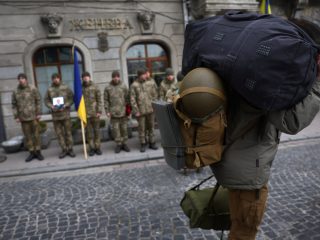Good morning. You’re reading the Up First newsletter. Subscribe here to get it delivered to your inbox, and listen to the Up First podcast for all the news you need to start your day.
Today’s top story
The U.S. Senate voted 60 to 40 last night to approve a continuing resolution to reopen the government. Speaker Mike Johnson called the House of Representatives back to Washington, D.C., as they will have to pass the measure before President Trump can sign it into law.
In addition to voting on the temporary funding measure, lawmakers voted on three bipartisan annual appropriations bills that cover specific agencies like the FDA. Moving forward with these measures means there is a chance of a partial government shutdown at the end of January, but programs like SNAP would continue. A provision to extend expiring health care subsidies was not included in the measure, but Senate Majority Leader John Thune says he will hold a vote by mid-December. In the legislation for the subsidies, Democrats who are in favor of them will need something that can win enough Republican votes.
Seven Senate Democrats and one independent joined Republicans in voting to reopen the government, a move drawing backlash from voters on the left who say the party keeps caving on key priorities. Democrats may have an advantage heading into next year’s midterms if affordability and the cost of living remain top concerns.
Delegates from nearly 200 countries have begun climate negotiations at the COP30 in Brazil. As with previous summits, the negotiations begin on a weak note as countries are still not meeting their goals to cut heat-trapping emissions from burning fossil fuels.
The world is currently on track for five degrees Fahrenheit of warming, which could lead to more intense heatwaves and storms and put ecosystems like coral reefs at grave risk. There is some encouraging news: over 90% of new power projects built last year were renewable, showing electricity is becoming cleaner globally. Stay up-to-date with COP30 coverage with NPR’s app-exclusive playlist of stories.
Some white Afrikaners and Afrikaans groups are pushing back against the U.S. administration’s claims, labeling them “lies” and “falsehoods” made in their name. The backlash follows President Trump’s announcement that no U.S. officials will attend the G20 Summit, which South Africa is hosting in Johannesburg later this month, citing human rights concerns.
Living better
Living Better is a special series about what it takes to stay healthy in America.
In recent years, efforts to improve Americans’ health have focused on reducing consumption of ultra-processed foods, which make up the majority of Americans’ diets. Health Secretary Robert F. Kennedy Jr. has said these foods are “poisoning” Americans. But public health and nutrition experts still don’t agree on a definition of ultra-processed foods:
– The term describes how much processing foods undergo, from unprocessed or minimally processed to those with manufactured ingredients and additives.
– Some experts argue that certain ultra-processed foods, such as plant-based milks, can be beneficial for health.
– For many, they are more affordable and accessible. Consumers seeking healthier options can make more informed choices within the ultra-processed category and reduce sugar intake.
Behind the story
This essay was written by Quil Lawrence, NPR’s veterans correspondent.
It’s Veterans Day today and NPR is the only mainstream national network with a dedicated veterans reporter. This week, Quil Lawrence released a two-part podcast on The Sunday Story from Up First, which follows the story of Dave Carlson, an Iraq war veteran he has been talking to for over a decade.
Back in 2015, while reporting, I learned that when you get incarcerated you become a ward of the state and often lose veterans’ benefits. I wanted to know what it’s like to have combat PTSD and then be thrown into an environment where you can’t let your guard down, where healing is difficult, and where services are limited. I found Carlson through his prison writing; his mother helped me get in touch.
There’s a lingering question from my years embedded with troops in Iraq and Afghanistan: what do we owe people who were sent to war and returned with painful but often invisible wounds? I haven’t fully found the answer, but this podcast helped me process that question through Carlson’s story. Ultimately, I think we owe veterans an open mind and the reminder that most vets are just like you and me.
Listen to Part 1 of the podcast here and Part 2 here.
3 things to know before you go
1. David Szalay’s latest novel, Flesh, won this year’s Booker Prize, one of the most prestigious awards in literature.
2. The U.S. Supreme Court yesterday declined to take up a case challenging its 2015 landmark decision legalizing gay marriage nationwide.
3. The Jacksonville Jaguars will host their home games in Orlando in 2027 while their stadium undergoes a $1.4 billion renovation, an Orlando City Council member confirmed. (via WUSF)
This newsletter was edited by Majd Al-Waheidi.



